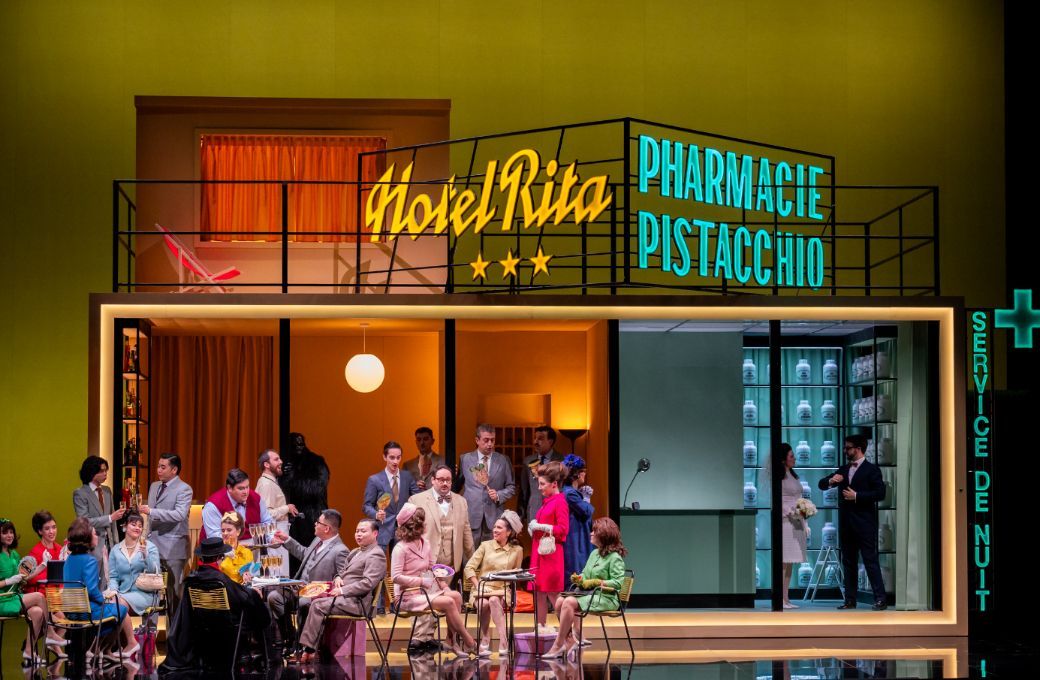Humour’s a funny thing. It can date so easily – there are some 1970s television sitcoms that would never get broadcast today – and it doesn’t always travel well. Spare a thought for the all-female directorial team charged with presenting a double bill of Il campanello and Deux hommes et une femme for Donizetti Opera at the petite Teatro Sociale. Yet faced with two problematic farces that each last barely an hour they somehow laboured them so heavily that they felt considerably longer. To be fair, the humour landed better with many in the audience than it did with me.

Il campanello concerns the wedding – or rather the wedding night – of apothecary Don Annibale Pistacchio and his young bride Serafina. Her ex-lover, Enrico, tries to win her back and plots to keep Pistacchio from the marriage bed by turning up at the pharmacy in disguise at all hours of the night and ringing the little bell – the campanello of the title – to which Pistacchio is dutybound to respond.
Deux hommes et une femme often used to go under the title Rita, whose subtitle Le Mari battu (The Beaten Husband) tells you pretty much all you need to know. Rita is a landlady, Pepé her henpecked husband. When Gasparo, Rita’s first husband, long believed to be dead, turns up, things get awkward, especially as it transpires that he used to rule the roost by violence. “While you can beat your wife, you shouldn’t knock her out,” constitutes Gasparo’s ‘sage’ marriage counselling to the timid Pepé.
Director Stefania Bonfadelli takes the prudent decision to play both works on the same set, so Hotel Rita is next door to Pharmacie Pistacchio, but this risks overpopulating Il campanello especially, where she also gives the chorus way too much comic business, including a wedding guest in a gorilla suit. Much of her staging is deeply unfunny, although for Enrico’s second disguise – a hoarse singer – the decision to dress him up as Luciano Pavarotti, complete with scarf, Panama hat, oversized white handkerchief and fake beard – raised a chuckle.
The students of the Bottega Donizetti, the festival’s academy, take all but one of the main roles. Bonfadelli doesn’t give them much help, encouraging them to over-caricature with even the smallest cameo overplayed to distraction. With experience, these fine young singers will learn that in comedy, less is so often more. Witness wily old Alessandro Corbelli, a Bottega mentor, who here took the role of Gasparo and promptly stole the show with little more than a series of sighs, winks and shrugs. At 73, his bass-baritone is still in decent nick too.
The young principals all sang well. Baritone Francesco Bossi demonstrated his vocal versatility, especially in Enrico’s swift patter when, in disguise as a blind man, he reels off a catalogue of his wife’s ailments. Lucrezia Tacchi’s pert soprano made for an attractive Serafina in Campanello, with Pierpaolo Martella suitably exasperated as her husband, a typical buffo role, and mezzo Eleonora de Prez his shrewish mother-in-law. Cristina De Carolis coped with the demanding vocal writing as a spitfire Rita, but it was Chilean tenor Cristóbal Campos Marín who really impressed in the thankless role of Pepé, his voice tender and flexible. He has a nice feel for comedy and is nimble on his feet – surely destined to sing Nemorino.
All six singers then featured in a Sunday brunch recital, presented by Opera Rara, packed to gunwales with rarities and premieres, accompanied deftly by Giulio Zappa. Eleonora de Prez particularly impressed with her rich mezzo and vocal intensity.
In the double bill, the period instrument band Gli Originali provided zingy playing under the baton of Enrico Pagano, assisted by Ugo Mahieux’s witty fortepiano interjections in the recitatives. Well, someone had to provide the laughs.
Mark's press trip was funded by the Fondazione Donizetti


